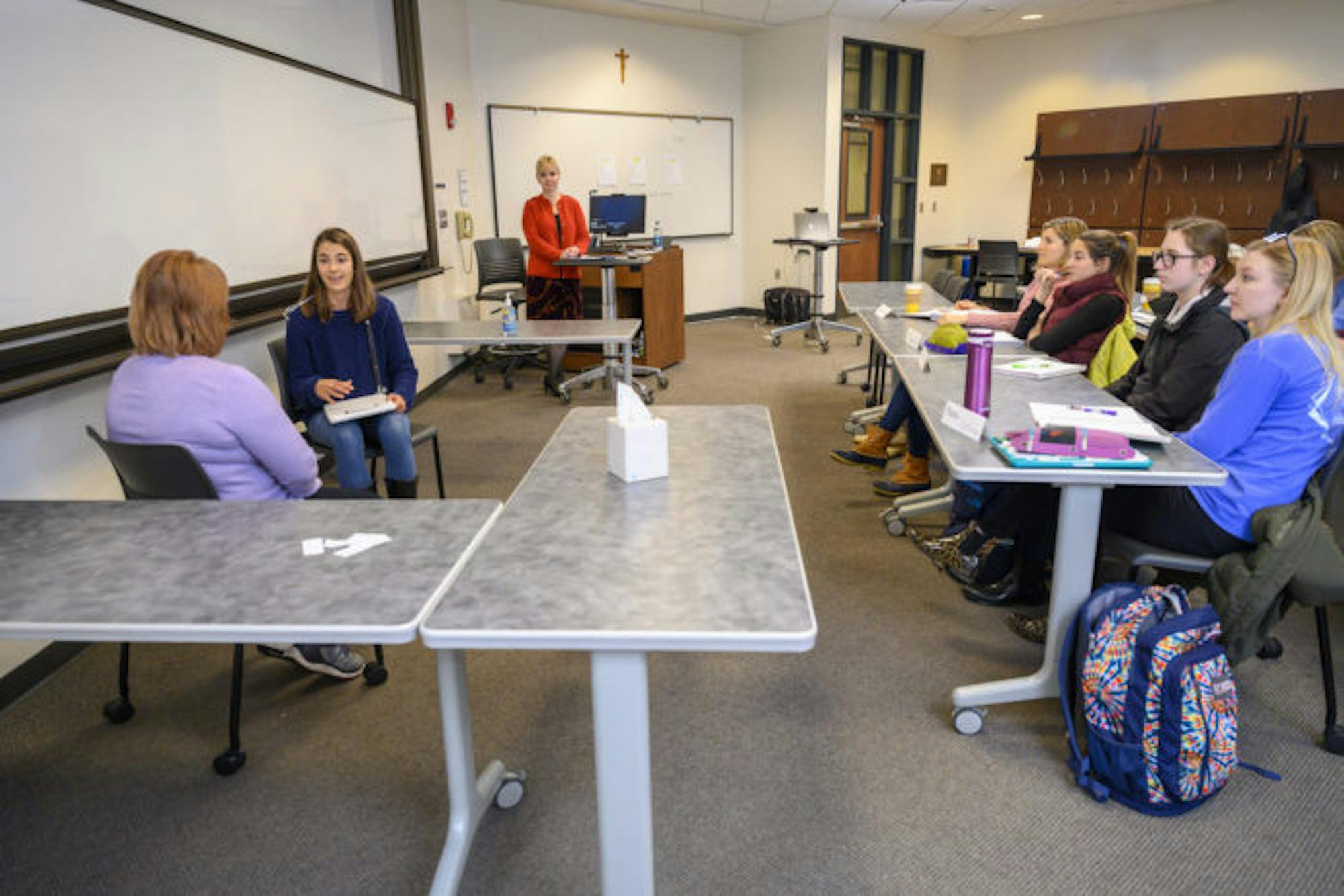Featuring an up-and-coming intersection of psychology, biology and neuroscience, the compassionate care in medicine (CCIM) minor within Notre Dame’s College of Science teaches students the science of compassion.
CCIM is part of the Ruth M. Hillebrand Center for Compassionate Care in Medicine and is led by director Dr. Dominic Vachon.
The minor features a gateway course into the science of compassion, followed by a variety of electives “to deepen a student’s understanding of compassion,” an experiential learning course and a capstone project, Vachon said. He emphasized that there are many different ways to complete the minor.
Vachon said the Hillebrand Center began offering courses on compassion in 2011, but didn’t offer a minor until 2019 when students began asking for a program.
“[The Hillebrand Center] didn’t think science majors would want to take more than one course. And then all of a sudden, they started taking all of them,” Vachon said. “Four years ago, the students were the ones that said to us, ‘Would you make this into a minor?’”
The science of compassion is a relatively new paradigm, Vachon explained, but represents an important step in the training of medical professionals.
“It’s our Hubble telescope that helps us understand more clearly what’s going on when we work with people who are suffering,” Vachon said.
Contrary to older theories, Vachon said that compassion must go hand-in-hand with the training of doctors.
“If you aren’t a doctor who’s centered in compassion, you’re really practicing outdated medicine,” he said.
Vachon explained that compassionate care is not just about being kind to patients, but also about learning how to connect with others and be empathetic without losing control of one’s emotions.
“A soft sentimentalized understanding of compassion does not really help people who do the difficult work of helping others and making the world a better place. The scientific understanding of compassion helps us know better how to respond to suffering in others and how to stay balanced in the process,” he said.
CCIM not only teaches students the skills to become well-rounded doctors, but it also gives students valuable tools to keep them from experiencing what has become a common occurrence in the health care field: burnout.
Recent graduate Quinn Retzloff said the techniques he learned during his CCIM courses have helped him maintain his composure in high-stress medical situations.
“I’ve actually had the chance to be in hospitals and see what physicians are dealing with during COVID,” Retzloff said. “Last summer, for instance, I was in trauma critical care surgery during the height of the pandemic, and I got to use the techniques and the strategies I learned with patients and with doctors.”
Retzloff said he noticed the doctors he saw practicing compassionate medicine were much less burnt out than the other physicians.
“The doctors I witnessed who distance themselves from the illness and, in turn, distance themselves from the person — they were burnt out, unhappy, unsatisfied,” he said. “But for the doctors who were able to see that person not as an illness but an actual person in need of their help, it seemed to make a profound difference.”
Retzloff said he also worked for Vachon’s research lab during his time as an undergraduate and that their work interviewing physicians about their techniques to stay calm during difficult work has been valuable to him.
“It’s a reminder that a lot of times when you enter into medical school and residency with this motivation, that gets burnt out and taken away from you because of the unrealistic expectations of health care, these practices work,” he explained. “Seeing these physicians reaffirms to you a commitment to practicing these skills, and that way you can be a better provider and better to yourself as a future physician.”
For Elizabeth Lucas, a sophomore majoring in preprofessional studies, the CCIM minor has also shaped the way she looks at her future career.
“Over the summer, I did a bunch of physician-shadowing in my hometown, and seeing how they interacted with patients after experiencing some of the classes and some of the things that I’ve learned through the club and through the minor, it brings an entirely different perspective to the way that I would look at how the doctors interacted with patients,” she said.
Lucas is involved with the CCIM club, which is open to all University students and offers many different shadowing and volunteer opportunities. She said there are over a hundred students who are active in the club — many of whom are not in the minor.
Vachon said the CCIM program currently has over 160 students enrolled, representing a wide variety of majors and colleges.
“While the minor was designed for students going into health care professions, it’s also a minor that’s good for anyone going into any profession that helps people,” Vachon said. “So many people at Notre Dame are dedicated to making the world a better place.”
Lucas agreed with Vachon and said that the program could benefit students from a patient’s point of view as well.
“Most of the people that are in the minor are pre-med, but I think that there are other fields that can apply a lot as well,” she said. “Even beyond that, honestly it’s important to know about these things as a patient too, rather than just as a doctor.”
Anyone interested in the minor can visit their website or contact Rose Carroll, the operations and strategic coordinator for the Hillebrand Center.













